Pop Culture: The Fairy and the Woodcutter
by javabeans
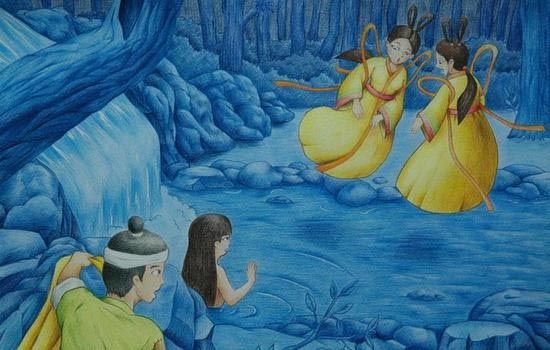
One of the reasons girlfriday and I wanted to open up the blog to this Pop Culture series is because we’d sometimes like to depart from the norm and muse about stuff. It allows us to take something from pop culture or society at large and run with it. Girlfriday took on the piggyback ride in her first entry, and I thought this would be the perfect occasion to bring up something that’s always struck me as odd and fascinating and disturbing: a particular fairy tale.
The catalyst for this post was a song by FT Island called “The Angel and the Woodcutter.” I had been listening to a lot of FT Island last year (blame You’re Beautiful) and one of their songs caught my attention because it was catchy and fun. But then I checked the title, and all of a sudden I felt conflicted.
You see, The Fairy and the Woodcutter is an old Korean fairy tale that many/most Korean kids grow up hearing, and even back as a child it had bothered me. I didn’t realize back then why, I only knew that it seemed really… wrong. But listening to FT Island’s song brought back all those early memories, and when I played the song back and listened to the lyrics closely, I remembered all those reasons I’d been so unsettled by the original fairy tale.
SONG OF THE DAY
FT Island – “천사와 나무꾼” (The Angel and the Woodcutter) [ Download ]
Audio clip: Adobe Flash Player (version 9 or above) is required to play this audio clip. Download the latest version here. You also need to have JavaScript enabled in your browser.
“The Angel and The Woodcutter”
You dazzle the eyes because you look like an angel
Your steps are light, like walking on clouds
You’ve come down from heaven for a short punishment
You’ve caught my eye, my heart feels it would stop
I want to hold on to you forever
Hiding behind you and secretly stealing glances
I am the woodcutterYou’re an angel only for me, a gift from heaven
Let’s be happy forever, the two of us
You’ll be my only love, I’ll always make you smile
I hope you’ll forget about heavenDon’t be sad
I feel uneasy that you’ll leave
My love must not be enough
If you want, I can do anything
Living only looking at you
I’m the woodcutterYou’re an angel only for me, a gift from heaven
Let’s be happy forever, the two of us
You’ll be my only love, I’ll always make you smile
I hope you’ll forget about heavenEven though time goes on, my love never changes
Till the moment I close my eyes, I’ll only look at youYou’re an angel only for me, my one and only love
I wish that we’ll live beautifully and happily, just the two of us
You’re my only love, there’s nothing to be sad about
Live with me in this place
I love you
I want to hide your winged clothes forever
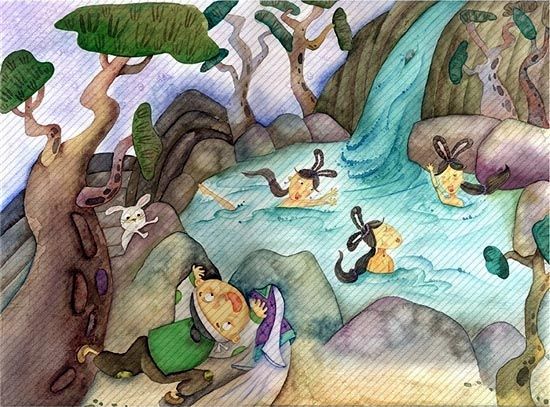
But before I get to the interpreting part, I’ve got to share with you the actual folk tale. Here’s a condensed version. (Note that this is in my own words, so don’t go around quoting it as the official story.)
There was once a poor woodcutter who lived in the mountains with his mother. One day he helped a wounded deer escape from a hunter, and in return for his kindness, the deer, who was actually a mountain spirit, granted him a wish. The man wished for a wife.
The deer told the woodcutter a surefire way to get his wish and outlined specific instructions. The woodcutter was to go to a mountain pond where fairies came down from their home in heaven once a month to bathe, aided by magical clothing that allowed them to fly. He was to steal one fairy’s clothing, stranding her in the pond, then offer to help her. If he brought her home, she would eventually fall in love with him and become his wife. The woodcutter must not reveal the truth about her clothing until she had borne him at least three children.
As ethics have no place in a love (or possession) story, the woodcutter did as ordered, and everything happened as the deer said. Hiding nearby, he watched as a group of fairies flew down from heaven and bathed, and stole one set of clothes. When it was time to return, one fairy couldn’t find her clothing, and her fellow fairies were forced to return to heaven without her.
The pervy woodcutter emerged from hiding to play the hero, offering her regular clothing and shelter. With no way to return home, in time she married him and bore him two children. And the woodcutter was happy. Selfish bastard.
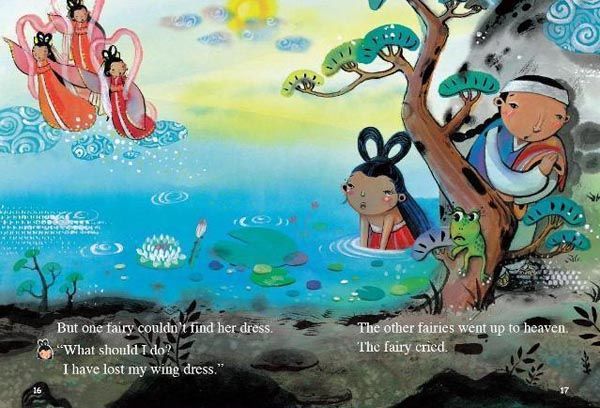
But once a month — on bathing day — his wife would feel homesick and cry for her lost life. And while the woodcutter was a scheming pervy jerk, he wasn’t completely heartless and finally decided that he would tell her the truth, figuring that her love for him would be enough, because they were an otherwise happy family. Let’s just say some people define happiness differently from others.
When he showed her the hidden clothing, the fairy put them on, took up one child in each arm, and flew up to heaven. And the idiot woodcutter was sad. Boo effin’ hoo.
The reason for the deer’s instructions now became clear — if he had waited until they had three children, the fairy would not be able to carry all her children up to heaven, nor would she be able to leave any behind. The deer saw that the man was heartbroken and offered him a solution. Thanks to Mr. Woodcutter’s security breach, ever since the fairy had been stranded on earth the other fairies had ceased bathing in the mountain pool. Instead, once a month they lowered a bucket to draw up water to heaven. It must not be much of a heaven if they’ve got no water up there. Just sayin’. The deer advised the man to get into the bucket, which would draw him up and therefore reunite him with his wife.
He did, and the family reunited. And they were happy.
Alas, his poor old mother had been left alone on earth, and after some time the woodcutter felt bad and wanted to see her one last time before she died. His wife appealed to the king of the heavens, because apparently all incompetent men are given three chances to prove their incompetence. The king offered the woodcutter a way to say his last goodbye, lending him a winged horse that would deliver him home. However, he must not get off the horse or he would be left behind.
The woodcutter did, and his old mother was overjoyed to see her son. She wanted to feed him, as all Korean mothers do, but he told her that he wouldn’t be able to get off the horse. So she offered to bring the bowl of freshly made gruel to him so that he could eat it here before leaving. However, the idiot woodcutter spilled the hot gruel on the horse’s back, and it reared up on its legs, knocking him off its back. The horse returned to heaven and the woodcutter died sad and alone. (And may or may not have turned into a rooster that crows his grief to the skies.)
The end.
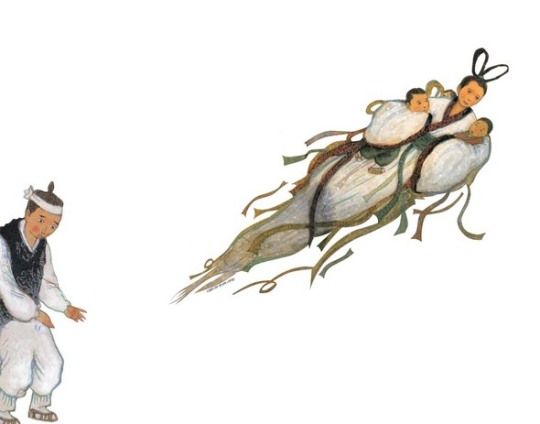
The song doesn’t have the same punch anymore, does it?
Don’t get me wrong, I’m not criticizing FT Island or the song. I like the song (with some reservation). It’s cute, and sorta interesting the way it extrapolates the woodcutter’s feelings to be a general love story — if you left out the references to the fairy tale, it could read like just another romantic pop song.
Can you see how my 6-year-old self was oddly uncomfortable with what is considered a perfectly ordinary bedtime tale before I even understand the words to describe what I was feeling? Perhaps one might argue that the kidnapping woodcutter died in the end, so it’s not like the story is holding him up as a role model. Only I’d disagree, because The Fairy and the Woodcutter isn’t told at bedtime as a cautionary tale; it’s just a story, like Cinderella. Sometimes the woodcutter is even painted in a sympathetic light — his rescue of the deer is highlighted, and he is described as a tragic victim of bad luck rather than his own stupidity.
Does a story HAVE to come with a morality clause? Perhaps not, but if bad behavior is depicted as the right course of action, the message becomes muddled. I doubt that this single story makes all Korean children grow up believing kidnapping is an effective method of courtship (although some dramas might have you scratching your head), but I think it’s problematic for fairy tales to put forth these behaviors and then treat them like there’s nothing wrong. It’s complicity by omission.
(Also note that I’m not saying Korean people are the only ones with messed-up folktales; there are a lot of Western fairy tales with arguably problematic messages, or at least motifs. It’s not a “this culture is better than that one” argument. I once had an English lesson wherein the teacher turned around the story of Jack and the Beanstalk to point out that the actual victim in the tale was the giant, and Jack was the jackass thief who invaded his home, stole his property, then cut down the beanstalk and killed him.)
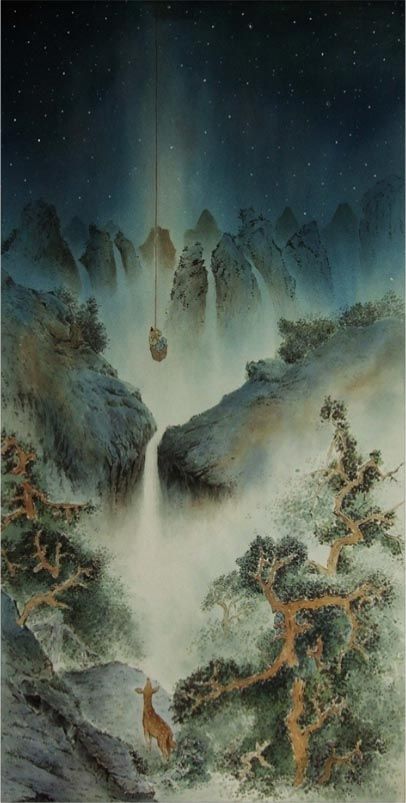
The Fairy and the Woodcutter glosses over the part where the woodcutter detains the woman against her will by means of subterfuge and deceit. In some versions he is even described as handsome, and a dutiful son. Because he is sanctioned by a heavenly agent (the deer, or mountain spirit), the story condones — approves, even — his methods and justifies the means for the sake of the ends. The story makes it a point to indicate that the wife wasn’t really unhappy with her life on earth — husband knows best! — but merely homesick. And that even when she left him to return home, she still loved him and was happy to be reunited with him in heaven.
Some of the same ideas are present in modern dramas — they aren’t limited to antiquated storytelling. Possessiveness is seen as bad when the possessive person is not part of the One True Pairing; then s/he is relegated to the role of the troublemaking second lead. But when possessiveness is displayed by the hero, isn’t it romantic? Isn’t it understandable, acceptable, even admirable when the hero goes to extreme lengths to make his relationship work? We as the audience put up with a lot of crap from heroes (and heroines, to be equal opportunity) when we know that ultimately they’re Meant To Be. Gu Jun-pyo, I’m looking at you and your wounded-little-boy charm. (And I say that as someone who totally loved his jealousy and misguided attempts to win Jan-di over in all the wrong ways.)
It’s interesting because there are themes in the tale that could actually encourage thoughtful discussion, but typically don’t. For instance, in this interspecies coupling, neither spouse is 100% happy despite a supposedly happy marriage with lovely children — the absence of family weighs heavily. This is also a theme we see frequently in dramas.
Now, the song I’d really like to hear is the one from the perspective of the poor manipulated and coerced fairy. Sure the tale says she eventually grew to love her woodcutter, but there’s a term for making the best of traumatic kidnapping, and that’s Stockholm Syndrome.
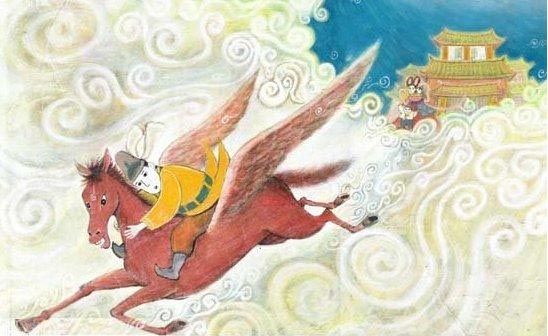
RELATED POSTS
Tags: song lyrics
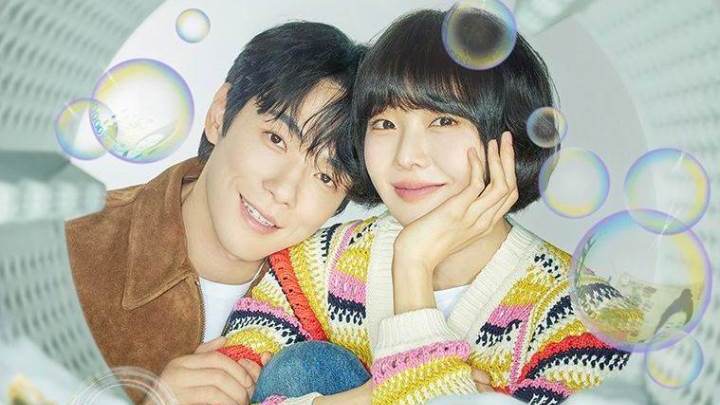







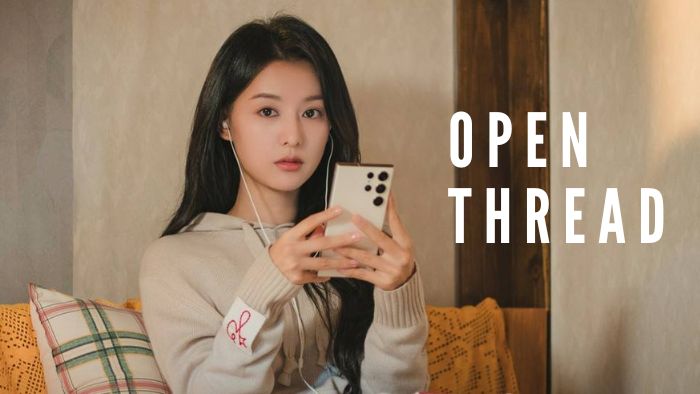

Required fields are marked *
Your email address will not be published. Required fields are marked *
51 annaNuna
August 1, 2010 at 8:00 PM
hah?? we have the same folkstale with Korean
I am Indonesian btw... I even have the big painting in my parent's house just like the pictures above...
waaaa...
Thank You JB, your blog is always awesome
Required fields are marked *
52 ohemgee
August 1, 2010 at 8:00 PM
i have always loved this song, but as i don't speak korean, and never bothered to look it up, i had no clue what this song was about!!!
thanks so much for the insight!
Required fields are marked *
53 joeydragonlady
August 1, 2010 at 8:04 PM
Doncha just want to smack the woodcutter in the head? I understand why children are told this story...so they'd be weary of weird preverted men. Men are so desperate for a wife he needed to trick her first? What happend to the kids since they are half human? Sorry to be weird but I do like to look beyond the actual storry. Thanks for sharing this.
Required fields are marked *
mmmmm6
September 20, 2023 at 4:03 PM
I never sympathized with the woodcutter and I always knew he was wrong. Also something so many people fail to understand is that not all protagonists are good.
Required fields are marked *
54 kappy
August 1, 2010 at 8:23 PM
Oh my, JB, I can see why you came away rather..uh...disenchanted after this was told to you. Falls into that category of 'Things that make you go "Hmmm"'.
I remember taking a class that explained that a myth came to be taken as truth by a people because it was the only (or best) way to explain a certain happening or phenomenon and it withstood the test of time. After a long enough while, there is no line separating myth from truth.
As with most cultures, Hawaiians have their myths, and this tale reminds me of some of them, not in the details, but in the feeling and the questions it left me with: What am I to learn from this? How did this come about? Why is this one still around? Should I lose any sleep over this? The answers to the first three questions may not be clear cut, but my answer to the last one is an easy "no" when I consult my conscience and the values I hold true. This is a good remedy for this confusing, mixed-message kind of tale. Still makes ya wanna go "hmmmm".
Required fields are marked *
55 Orion
August 1, 2010 at 8:47 PM
Very very interesting post about this. That truly is, a very bad fairytale. Then again, most Western ones as well, are completely insane. We have to remember that fairytales are still stories written by adults. And they always show the ideals and beliefs of the times they were writen in.
Of course a woman who is forced to marry a guy and have kids with him should be happy. He gave her kids! That's all women need! :P I mean, I don't see East Asian countries as the most woman-friendly in the world so such a story doesn't surprise me.
Indeed, fairytales don't ruin people, but they do create bad role models. What romantic girl doesn't dream of a perfect Prince Charming cause of all the fairytales and damn Disney movies? :P
Girls grow up believing there actually are such handsome and perfect men, not to mention that every fairytale princess is this pretty and cute creature with no brains who needs nothing but her looks and cuteness to win the prince over.
And then we wonder why the world keeps getting more and more bimbos.
I think childhood and early adolescence are very important times in a person's life and the role models, ideas, morals etc provided should be things that depict the real world we live in and what's really right, not just what sells.
Required fields are marked *
56 reluctantbutaddicted
August 1, 2010 at 9:16 PM
I hadn't heard the song before (which now I quite like... I think) or heard of the fairy tale. So I doubly appreciate the retelling and the analysis. The possessiveness in Asian drama I always find uncomfortable... I loved Domyouji (and also Gu Jun Pyo, though differently), and still admire his single-minded devotion (hence I can't abide the Taiwanese version, have even blocked out his name on the basis of that travesty that was Season 2), but his wooing methods were questionable, at best. You're absolutely right, when the possessiveness is contained within the OTP it is totally forgivable, even desirable. But outside of couple whose happy ending we count on, it's irritating, unnerving and in some cases, bordering on illegal, and often rouses anger and violence in the viewer. Good point.
Anyway, I appreciated this thoughtful essay. Thanks!
Required fields are marked *
57 rhianti
August 1, 2010 at 9:18 PM
well...we have "Jaka Tarub" legend in Javanese culture in Indonesia :)
it's surprised me that almost many countries have similar traditional story /legend.
Thanks JB :)
Required fields are marked *
58 amhrancas
August 1, 2010 at 9:30 PM
In my studies I've actually come across variations of this legend/myth/faerie tale in a number of cultures; I must say that your rendition is my favorite ^_^
It has always bothered me on a number of levels, the whole premise of gaining a spouse via deceit and selfishness, but as the practice is certainly not unheard of in human history it only stands to reason that it would have worked it's way into our lore. Now, we can just hope that the kids who hear the stories today are able to discern what is wrong about it, and learn from that as well.
Thanks again for these Pop Culture articles!!
Required fields are marked *
59 corrakun
August 1, 2010 at 10:00 PM
this is an amazing post. thank you, jb! i actually came across this story before in a manhwa called faeries' landing. interestingly enough, the manhwa took the side of the woodcutter and ~his~ children, and demonized the fairy mother. even then, i found myself sympathizing with the fairy's side of the story and totally understood why the manhwa version of the fairy fiercely hated the woodcutter, no matter how hard the artist tried to make her out to be a bad mother or wife.
Required fields are marked *
60 elena
August 1, 2010 at 10:02 PM
Hi, thanks for this, i've felt like this over fairytale since I was a child.
You might like Sara Bareilles Fairytale, if you have not already heard it.
http://www.youtube.com/watch?v=ZJYUgz5xUco
Required fields are marked *
61 elena
August 1, 2010 at 10:10 PM
http://www.youtube.com/watch?v=2cGQoPmefyA&feature=related
This one is better - well more fun.
Required fields are marked *
gretac
January 31, 2012 at 5:56 PM
Nice!!
Required fields are marked *
62 chajjye
August 1, 2010 at 10:12 PM
LOL.
I know this fairytale...with some deviations. Chinese have the same. But I'm kinda muddled about how the ending went. There's just too many folk tales from China add on with the fairytales from the West that I kinda got a bit lost.
Did they become so sad that every year on the 7th of July, a group of swallows will form a bridge between heaven and earth so that the separated lovers can meet only once? LOL. I think it's another story. O__O
Interestingly though, either I'm quite the ignoramus or sadist, cause I thought the story was romantic (well, I only remember the wifey part) LOL. -__-
Required fields are marked *
63 chajjye
August 1, 2010 at 10:16 PM
@ck1Oz:
you can tell ur kids about Sound of Music, Mary Poppins, Annie and all that nice musicals. LOL. I think nowadays kids lack those stories.
BTW. No one should ever sing "Rock a bye Baby" as a lullaby. Nursery rhymes aren't really for the nursery. Really.
Required fields are marked *
64 nunathloogagamiut
August 1, 2010 at 10:23 PM
Ooh, my first comment on this site.
LOL, Korean folk tales. I remember one where a man got rich by rolling on the ground all day, and another where a family got into turmoil because they'd never seen a mirror before (for example, the wife saw herself in the mirror and thought her husband had brought home another lady who wasn't even pretty XD).
I always did think the woodcutter was a perv. I seem to remember one version where she did have three kids, but she carried the third one between her feet, heh.
Thanks for the awesome post. :) Your website is awesome.
Required fields are marked *
mmmmm6
September 20, 2023 at 4:04 PM
I had a book with traditional Korean folktales and the book's version had two children that the fairy carried under her arm, but my mom told me a version with three children and she told me that she carried the third child between her legs.
Required fields are marked *
65 Ata
August 1, 2010 at 10:24 PM
Good tale, but I’m not surprised as to why it’s messed up. It’s a fairy tale after all.
I read Grimms' Fairy Tales (not the Disney-fied versions) several times when I was a kid, and found them delightful and entertaining. Horrifying at times, but I wouldn’t say I was disturbed.
Years hence, read them again, and I found them riddled with sex, horror and violence, it was quite amusing. Rapunzel and her prince pretty much fornicated when they met. The tale of Hansel and Gretel (it’s got sadism, cruelty to children, cannibalism, etc.) is the ultimate social worker’s nightmare. Cat-skin is just yuck, about incest (and the story is quite straightforward about it).
It’s no wonder fairy tale themes make good fodder for horror and melodrama, or maybe the latter are just fairy tales of the day.
And maybe children are just wired differently.
Required fields are marked *
66 LadyIgraine
August 1, 2010 at 10:25 PM
i'm glad i read the story...i only hear this from variety shows, but never actually knew the story of "the fairy & the woodcutter."
Required fields are marked *
67 Porcelain
August 1, 2010 at 10:44 PM
Very interesting and educational...
And trust me, there are more uncomprehendable fairytales from all side of the world... Western, Chinese, Asian etc...
I always wonder how will things be like on the other side of the coin... thus reading this is refreshing... like what ifs and what not... right or wrong is another concept totally.
@Qwenli = 嫦娥奔月
http://en.wikipedia.org/wiki/Houyi
This is the hubby, the wife is the one that flew to the moon...
And as kid I think she stay on the moon with only a bunny for company...
Folklores!
Required fields are marked *
68 Ani
August 1, 2010 at 11:01 PM
I love myths and legends. Not all are exactly good, but they sure become thought provoking.
Required fields are marked *
69 xing
August 2, 2010 at 12:16 AM
@50
the more accurate comparision i think is Legend of The Cowherd and the Weaver Girl 牛郎织女 , it is one of the four classic chinese folktale and there is a day in the calender to marked the reunion of the couple ,which happen once a year. this is suppose to be a great love story but i think the korean version make some revisoin
there is a reason why the cow told the cowherd about getting the weaver fairy as his wife because they were supposedly lovers up in heaven but he was banished to earth as this is forbidden up in heaven . so that is why it indicate a continuation of their destiny
http://ilearn-culture.com/folklore-cowherd-and-the-weaver-girl/
but the cowherd didnt die nor he went up to heaven . they compromise by having them met once per year on the 7th day of the 7th month
the tale is really a way to explain the stars formation and the milky way in a romantic way . there is another tale with fairy falling in love with the commoner named Dong Yong , 董永与七仙女 but that one is more focus on the Filial piety of dong yong but i think he also never went up to the heaven .but remain on earth with the son and when the son grow up , he was the one who went to steal the clothes of the seventh fiary to make the mother stay .something like that ~
http://traditions.cultural-china.com/en/13Traditions353.html
Required fields are marked *
70 tildy
August 2, 2010 at 12:31 AM
Fantastic post!
I love fairy tales, mostly because they're so dark.
I agree that just about every culture has some folk/fairy tale about the folly of a man/woman who disregards advice and winds up losing what he/she has gained.
Required fields are marked *
71 marmot
August 2, 2010 at 12:52 AM
Thanks for describing the Korean version of this story! I hadn't heard of it before, but it sounds like there's some version of this story everwhere!
Here's what Greek/Roman mythology do with goddess, hunter and deer:
Diana (Artemis) the beautiful virgin goddess is secretly watched by a young hunter as she bathes naked in a stream. Diana discovers him, and is afraid he will boast of what he's seen. She turns him into a stag - and he is torn apart by his own hounds.
And yeah, original fairy tales/myths were dark and not necessarily with happy endings--and therefore much more interesting and dimensional than the bland fluffy stuff people call fairy tales today. Loved the Brothers Grimm series.
The tame Disneyfied fairy tales we tell in America today also feel "wrong", too, but in the opposite direction. They reflect our society's glorification of childhood which is essentially dragged out 2+ decades, and the idea that children' can't handle or shouldn't be exposed to ambiguity or anything but sugary happiness.
Required fields are marked *
72 Jenny
August 2, 2010 at 1:00 AM
First great post!
This storie reminds me of selkie stories from Ireland and stories about heavenly maidens in Japan (Tennyo)
The japanese story is similar but in one versions the maiden dances to the fisherman and he is so moved that he gives back her feathered coat. I have even seen a Noh play based on this.
How much a asian folkstories changed compared to european, I know that the stories Brothers Grimm collected were changed and the origanl stories were really quite horrible(of course they were created to warn and teach)
Required fields are marked *
73 rylee
August 2, 2010 at 1:10 AM
Dunno if Korean fairytale histories are anything like Western Europe's, but those stories weren't supposed to be for kids at all... They were supposed to be horrifying bloodbaths with lots of death and sex to make sure you kept paying attention, so more like blockbusters than art films or kidlit. Afaik, the "fairy" part of fairy tale was really about the outside or otherness of the social or ethical spaces explored in the stories. Morals had very little to do with those. (France had its Contes et Fables, which were moral stories, but those were also told to the courts and not necessarily the children.)
Required fields are marked *
74 shin mi rae
August 2, 2010 at 1:37 AM
bravo jb!
i agree that there should be a stop to this wrist grabbing thing in kdrama land. it really is weird how we turn giddy when the hero follows the girl around to make sure she is safe or whatever, but another person who will do this other than the hero (or the super handsome kind hearted second lead) will be called a stalker.
this post is another blockbuster.
Required fields are marked *
75 kit
August 2, 2010 at 2:36 AM
yay ft island (never really liked them until their third (?) album where this song was featured. barae and marry me are cute and uppity and adorable and basically like jeremy in you're beautiful xD)
i grew up reading these fairytales in both english and korean and i used to get annoyed too. i was a bit of a raging feminist then - by that, i mean stomping on boys' toes and screaming at them and stealing their food. ahem. but this was mad interesting, and i love how you're highlighting some of the deeper stuff in korean culture.
Required fields are marked *
76 jenknight18
August 2, 2010 at 4:31 AM
"i agree that there should be a stop to this wrist grabbing thing in kdrama land. it really is weird how we turn giddy when the hero follows the girl around to make sure she is safe or whatever, but another person who will do this other than the hero (or the super handsome kind hearted second lead) will be called a stalker.
this post is another blockbuster."
@shin mi rae you just exactly said what i was about to say!!
Sometimes leads who hates their parents because of their mischievous past are excused and most of the time we cry with them accusing their parents how dare them keep the secret.. but when it is the second lead who has a family issues.. seldom we care..
Required fields are marked *
77 steffy
August 2, 2010 at 5:38 AM
wew what a coincidence, Indonesian grew up with this kind of story too. It's titled Jaka Tarub! :D
Required fields are marked *
78 Lemon
August 2, 2010 at 5:51 AM
Wow I just love all these pop culture and glossary posts. It's really fun to read yours and Girlfriday's takes on such issues and cliches.
I have never heard of this folk tale before, although I have heard of the FT Island song (yes, I've been listening to them cos of You're Beautiful too!), so this was very interesting and new to me. A lot of fairytales have actually bothered me; such as Cinderella, the Little Mermaid (though it's my favourite), Hansel and Gretel, etc, since they make an rather sinister story seem happy and lovely.Eek goosebumps.
Thanks for this post! (:
Required fields are marked *
79 Yaya
August 2, 2010 at 6:03 AM
JB: the only thing I've ever seen from the POV of he kidnapped woman is an Indian film called "Pinjar", or "Cage". It was an extremely heartwrenching (most likely true) tale set during the partition between India and Pakistan. A young Hindu woman, , is kidnapped by a Muslim man, Rashid, and is essentially forced to become his wife. She of course detests and despises him but she finds that is trapped with him: when she eventually runs away back home to her parents, she finds that it is too dangerous lest the Muslim majority should come and attack the Hindu minority in the area.
Heartbroken, she returns to her husbands house and despises him even more. She resents having any relations with him and there's a strange relief when she miscarries his child since it is essentially from rape. Yet she finds out that Rashid has fallen in love with her and did not want to abduct her but was forced to by his family, due to a complicated family enmity with Puro's family.
They rally again together when she finds out that her sister-in-law has suffered the same fate and she vows to help her. She infiltrates the house and manages to break out her sister-in-law. When they return her sister-in-law home Puro is asked by the man who was first betrothed to her to come back and marry but Puro declines: she cannot leave her husband now. It ends with Puro saying that with every daughter returned home think that Puro returned with her.
It's completely heart-wrenching and extremely difficult to watch but I recommend it: at the end of the day Partition did occur and destroyed many, many lives, regardless of religion or nationality.
Wikipedia has a more in-depth plot summary (which defeats the point but anyway...)
Required fields are marked *
80 jubilantia
August 2, 2010 at 6:04 AM
Great job! I love looking at stories in different cultures. I really think that, like dramas and other forms of media, they reflect the cultures they come from and really illuminate issues that plague those cultures. As such an examination they are relevant, and I love thinking about them like this! Which is basically what you said. However, if you haven't yet, you should read Neil Gaiman's American Gods- he is wonderful at taking myths and legends from different cultures and looking at them in a totally new way. Norse mythology is generally at the center of things, but you see mentions of asian and other fairy tales as well. In a sense, his stories follow the attitude of fairy tales, even respect them, while often subverting or poking fun at them.
A great series is the FABLES graphic novels. In the story, characters from mythology and fairy tales live in the land of fables, but fled to our world 300 hundred years ago when the Adversary began terrorizing their lands. As you can imagine, they've all got interesting personalities and an underlying theme of the story is the life our beliefs give them. Anyway, now that I've gone completely off subject... awesome post and I would love to see more like this, especially with all the gumiho stuff coming out. It sounds like both of those dramas are taking the classics in a whole new direction, and I'm excited to see your opinion. Scraps of asian mythology have come through with Miyazaki movies, manga, and some kids fairy tales I've picked up trying to learn Japanese, but I still don't know a lot about Asian fairy tales and I would love to learn more.
Required fields are marked *
81 tori
August 2, 2010 at 6:09 AM
hmm... this is so similar to the anime story ayashi no ceres. well, the foundation of the story. didn't know that it was a korean fairytale. i thought it was of japanese origin.
this is a classic example of man's selfishness and that he often succumbs to satisfying his own happiness. it also shows man's vulnerability, how easily he could be persuaded, make a decision and find himself getting bad results. great read, i'd say.
thank you for sharing this. i am looking forward for more.
Required fields are marked *
82 pohonphee
August 2, 2010 at 7:25 AM
Yeah we have a much like fairytale in Indonesia, If I'm not mistaken, it is Joko Tarub legend, right? I'm amazed too Korean has one similar. I never like this kind fairytale. And not too fond of fairytale like Cinderella, Sleeping beauty, Little mermaid, etc. Feel these fairytales are too much for me for some reasons. Girls have more things to do beside chasing/waiting after "perfect" love live. Sorry guys...
Required fields are marked *
83 kimi
August 2, 2010 at 8:26 AM
Hi, just want to tell you that Cambodians have a similar story but some part is different. There's also a classical dance of this story which is Khmer it is call " Preah Anuruth, Preah Neang Ousa" the prince Anuruth and princess Ousa. Here is a video of the dance and the summery of the story, if you interested Javabeans. http://www.youtube.com/watch?v=ZUryhxijhxY&feature=related
Start at 0:48.
Required fields are marked *
84 kimi
August 2, 2010 at 8:28 AM
my bad the name is Preah Sothun and Neag Monohara. Sorry
Required fields are marked *
85 snail
August 2, 2010 at 9:31 AM
I think most of Asian cultures have this fairy left behind on earth coz some perverted guy steal her gown, I know Indonesia has one, but some parts are different, but the way JB re-tell the story sure open the pandora box of childhood awkwardness when hearing this story, you're right, when you hear the same story again now, that's no romance in it (spin all you want), I smell crime charges all over the place there haha.... anyhoo, this posting brighten up my day after war at work... :) :)
Required fields are marked *
86 Sarahbelle
August 2, 2010 at 9:33 AM
Haha! I always thought that about Jack and the Beanstalk. But in the same way you described, like it just bugged me as a kid and I couldn't really put into words why.
I still kinda like the song :) I think it's all meant innocuously, that he's not really being possessive but rather mostly trying to compare her with an angel. Taken a bit further, I can see how it would be sinister and gross, though.
Required fields are marked *
87 okdubu
August 2, 2010 at 10:12 AM
so i'm back after actually reading through the post and now i vaguely remember reading this story in a picture book when i was a child lol. that fti song is one of my most frequently played fti tracks in my library too lol i didn't even realize what the lyrics were talking about....
you make very good points! i don't have anything to add except yes.. i'd love to hear the story from the fairy's point of view.
Required fields are marked *
88 ockoala
August 2, 2010 at 10:34 AM
@ tori
Ayashi no Ceres the Japanese manga is based on the Japanese folk tale of their Tennyo (or Fairy Woman):
The famous Noh play is Hagoromo or 羽衣 (which means Feathered Cloth), about a fisherman that sees a fairy bathing and takes her magic feathered cloth and won't return it to her so she can't return to the sky....and so forth.
What a complete bastard. JB is right, these folktales are so misogynistic and male-ego oriented. It's no wonder they don't end it "but the fairy asked for it, why else was she bathing in public."
Required fields are marked *
89 someone
August 2, 2010 at 10:39 AM
japan has the same folk tale. they also did an anime and manga of that. it was by watase yuu called 'ayashi no ceres'.. there you'll see the maiden plotting revenge against her own lineage lol
Required fields are marked *
90 rose
August 2, 2010 at 11:13 AM
that was interesting XD
I love reading folk tales ^__^ ..
but it's kinda reminded me of one of the Arabian nights stories ..
it was something like this, stealing a fairy clothes and marring her eventually because he loved her :D
Required fields are marked *
91 angryparsnip
August 2, 2010 at 11:50 AM
I enjoyed reading all the comments but as an artist I loved all the Illustrations you posted.
I have bought many Korean Folk Tale book just for the artwork alone as I can't read Korean.
The Japanese ones I have my children can translate.
Thanks for the great post today.
cheers, parsnip
Required fields are marked *
92 Jo
August 2, 2010 at 12:42 PM
I just wanted to say:
The basket picture is so pretty.
I absolutely love picture books-they're so beautiful!
Required fields are marked *
93 lauren
August 2, 2010 at 12:56 PM
Ahhh I have to go to school soon _._'' but I will definitely read this post straight after I come back home! Now I have something to look forward ^^
Required fields are marked *
94 gbo
August 2, 2010 at 1:12 PM
just want to say "like" to this post. all parts of it. i remember as a child not liking this story either. you're not too young to know right from wrong and a guy spying on women bathing and stealing her clothes so she has to get help from him is not at all ok.
Required fields are marked *
95 jelly-jamboree
August 2, 2010 at 1:57 PM
I've been reading the comments to this post, and am interested by all the similar stories from around the world (I'm not so sure if a global fascination with kidnapping is such a great thing though. It would be nicer if we had other things in common).
As for me, I was reminded of the Broadway musical "Seven Brides for Seven Brothers," which was also a movie that I now guiltily admit that I enjoyed watching when I was little. The whole plot line deals with seven brothers kidnapping women & trying to make them fall in love with them before help arrives (erm, they have all winter because they caused an avalanche in the mountain pass leading up to the house).
Anyway, I guess as long as it's possible to kidnap someone & there are mediums like music, movies, and our beloved Kdramas, kidnapping for "the sake" of love will continue!
I admit, if Jang Geun Suk ever decided to kidnap someone (or be kidnapped!) in a drama... I might be tempted to watch >.>;;
Required fields are marked *
96 Sam
August 2, 2010 at 9:04 PM
I loved that song ;___;
Thank you for the meaning behind it
Required fields are marked *
97 lauren
August 2, 2010 at 9:07 PM
I finished reading the post. All I can say is wow. Wow wow wow wow. That is one of the most horrible fairytales i've ever heard. -__- I could go on criticizing the story forever and ever o.o it's promoting lots of horrible things. It sets a really bad example for young kids. My childhood would have been messed up if I heard that fairytale then o.o
Required fields are marked *
98 xtool
August 2, 2010 at 10:17 PM
Wonderful post and great comments, also.
Same kind of experience here in US growing up on Disney versions of classic fairy tales, and then being going back to read earlier versions to discover that they were way dark and very, very "Grimm". It seemed to me that they had been originally intended as cautionary tales - something on the order of "don't go walking in the forest alone - strangers will do bad things to you" or "it's a dangerous world out there."
There was a book by Bruno Betelheim called "Uses of Enchantment" that dealt with the whole business of fairy tales at great length.
As I recall, the "happy, happy, all the time" Disney versions were deemed "suitable for children", but Bambi's mom got shot and killed, and Dumbo's mom got confined and tortured. So much for "happy, happy, all the time" - maybe it was ok because they were animals...
At any rate, it's a special pleasure to get to hear comments/ideas from all over the world on this topic. Universal, no?
Required fields are marked *
99 sajor
August 3, 2010 at 8:36 AM
interesting topic. well-written. thanks jb!
@97 lauren:
if this is a common fairy tale told to korean kids, then there can be a way that it can be told positively with moral values, as i think most (if not all) fairy tales have moral values in them. perhaps you can refer to post #35all korean girl, she remembered this tale as a good story about obedience. and although I may have a hard time imagining how this could be toned down to be suitable for children, i'm not a child anymore. i now see the tale as an adult and definitely more informed, which makes whatever negative message this tale can convey to be taken more appropriately (i.e. for entertainment purposes only). so i think most of the "horrible" things you see (now that you're an adult) it promotes will not have been there if you have heard it when you were young. anyways, bottomline is, as a fairytale for children, this story can serve a good purpose.
Required fields are marked *
100 Lucky
August 3, 2010 at 12:32 PM
Loved your rendition of the fairy tale!
"Sure the tale says she eventually grew to love her woodcutter, but there’s a term for making the best of traumatic kidnapping, and that’s Stockholm Syndrome." lol!
Witty comments aside, this was another really interesting post. Thanks JB!
Required fields are marked *